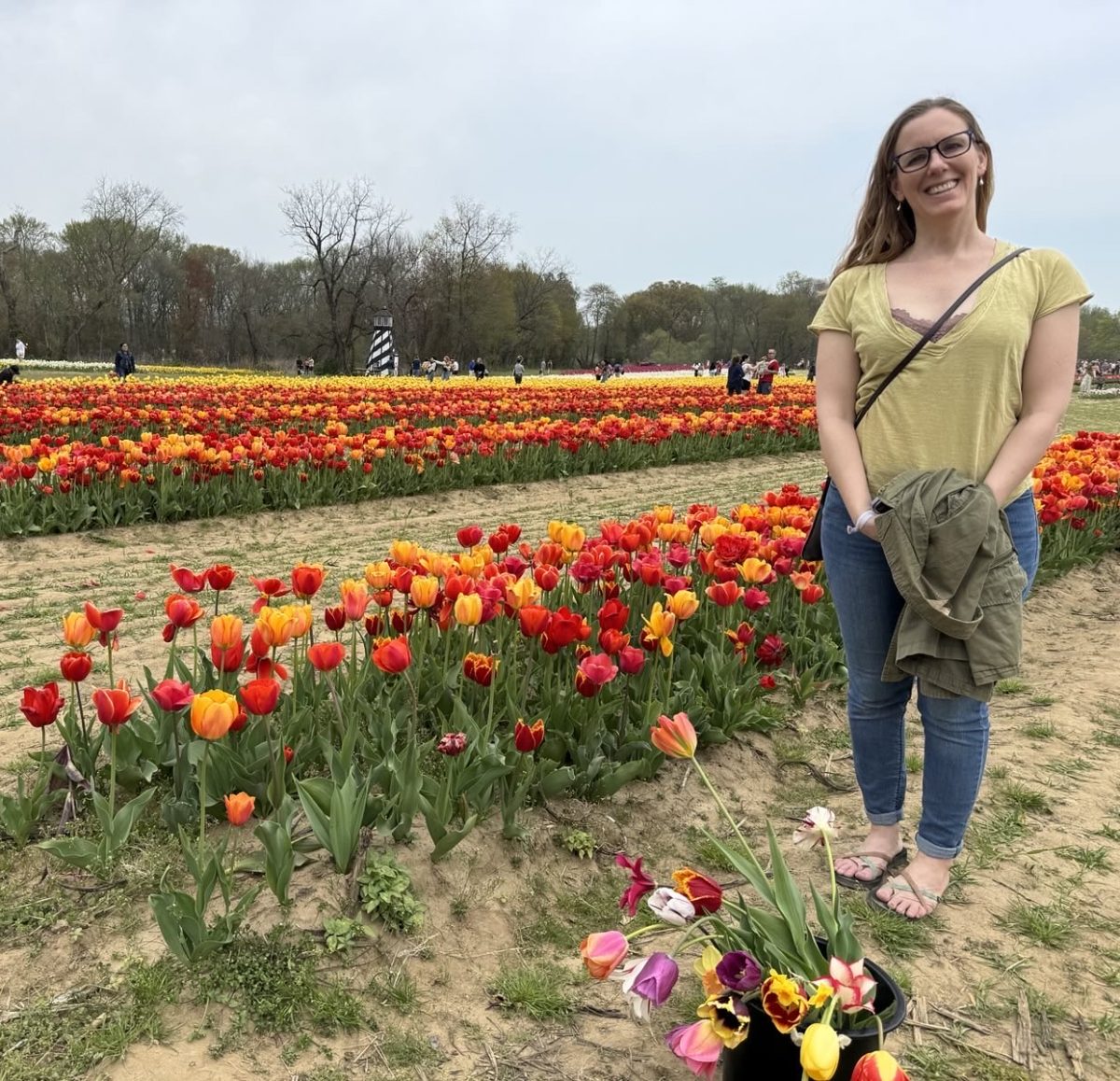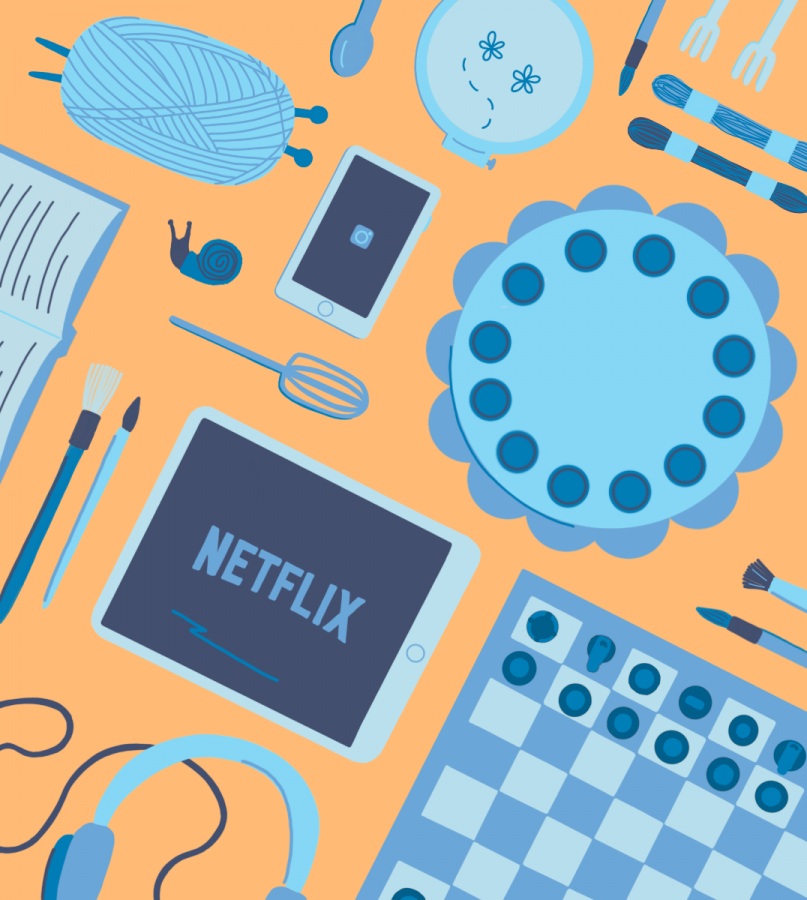How to Distract Yourself from Impending Doom
(Note: All interviews were conducted prior to November 20th, when the city of Philadelphia announced that maskless outdoor gatherings are no longer allowed, among other things.)
Do you find yourself continuously falling into a deep pit of despair? It may seem difficult to relax right now with an ongoing pandemic, a virtual learning environment, and external political and social factors, but many community members are finding ways to still have fun and de-stress.
Both students and faculty members are trying to deal with various sources of stress. Art and English teacher Zoë Blatt reports feeling “very stressed as compared to the beginning of 2020. There’s a lot on my mind—things in the world, and family, and work, and they’re all causing immense stress.”
Elena Milliken ‘22 agrees, saying that she feels “200 times more stressed” and that “the world is exploding around us.”
“Since March, I have had days where my stress is not just high, but highly distracting,” says Director of City Curriculum Margaret Smith. “I’ve definitely had moments when I struggled to get my normal amount done in a day. I’m privileged to say stress of that level is a new phenomenon for me, so it has been a learning experience.”
So how are people coping with this existential tension? Elena says, “I watch tons of TV. That is my coping mechanism—I bury myself in Grey’s Anatomy, West Wing, and Pride & Prejudice characters.”
Television seems to be a common thread: a number of students and faculty note that it has been a method of distraction from unwanted emotional strain. Rachel Luce ‘21 lists a number of shows that she’s currently watching, most notably Reign, a show with about 20 episodes per season that she started watching one day before. “I’m already on season two,” she says with a chuckle.
In teacher Matthew Rosen’s senior advisory, binge-watching has become a shared practice. Matthew says, “Now that you guys told me about Breaking Bad, I’m watching that.”
Izzy Ebede ‘21, one of Matthew’s advisees, enthusiastically adds that “everyone in this advisory needs to watch Breaking Bad.” This statement was affirmed by Tony Lian ‘21, who has recently started watching the show.
In a similar vein, many students have had to find new ways to engage socially with their peers. Chris Crisden ‘22 emphasizes his need to talk to people regularly, and that a favorite activity of his is “entertaining” others via mediums like his Instagram, live show, Chit Chat with Chris.
Isabelle Hills ‘21 notes dining as a way to have fun and have a social life while still following social distancing protocols. “I’ll meet up with someone,” she says, “and we’ll eat outside in a park so we can keep distance.” Scarlett Schneider ‘24 also notes the importance of getting outside and interacting with friends in a safe manner.
This echoes the CDC’s advice to connect with others during the pandemic, as well as Margaret’s advice to “talk with friends and family, because sometimes stress needs a release, sometimes it helps to have external validation that your stress is reasonable, and sometimes stress makes one feel isolated and some human connection can be a powerful antidote.”
Rachel reports, from a box in teacher Sarah Kelly’s zoom room during office hours, that she often turns to office hours for fun during school hours. Another attendee of Sarah Kelly’s office hours, Sarah Goldberg ‘21, says, “I’ve been putting all my energy into my new snails—they’re very high maintenance.”
Both Sarahs have also been spending time baking. Sarah Kelly herself says excitedly that she “found this new recipe for chocolate Oreo cake.”
While Dean of Students Norman Bayard says, “I am not allowing myself to be stressed because it is not good for my body and for those that I love and serve,” he notes that he is watching Netflix, teaching himself how to play chess, and “thinking about making a cheesecake.”
For some students, especially at the end of a quarter, stress relief comes not in a specific calming activity, but simply in the act of taking time to do anything other than work. Julian Haurin ‘21 says, “honestly, when it gets this busy…it seems like the way I relax is just not doing homework or college applications.”
Lily Brin ‘23 is happy to be busy with activities like White Antiracism Group, Feminism Club, The Falcon, and a Model Congress program that she’s recently started working on, and she is also excited for a break. “To be honest, summer was not a break [for me]. I did courses of one kind or another throughout the whole summer, I didn’t see my friends once, and I didn’t go on any sort of vacation. So it’s really like one huge almost one and a half year block of school.”
Lily and teacher Ian Lockey both note exercise as a coping strategy for stress. Ian has also been spending time listening to audiobooks and research for his classes and for his own interest around topics like “Classics and its reception, race in America, and linguistic histories.”
Multiple faculty members express that they’ve made efforts to be intentional with their news intake in order to reduce anxiety. Margaret says, “My partner and I have been taking turns taking news breaks. If one of us needs a news break, the other one takes responsibility for following the news and providing a bullet point list of must-know events at dinner. That way we can both stay informed, but we can also take an occasional breather from elements of the news that frustrate us like tone, clickbait headlines, repackaged stories, and sometimes just poor reporting.”
Zoë has a similarly-motivated approach: “The biggest thing I do [to relieve stress] is try to shut off my phone and computer by 7 o’clock at night. I watch TV, read, knit, paint, spend time with my husband, and try to make a nice dinner. I’m constantly connected all day long with work and the news, so it’s really important for me to have those last couple of hours for myself and my family.”
Math teacher Sowmya Srinivasan says, “Since the pandemic started I’ve tried to be more deliberate about the time I spend on things other than work. I make sure to set aside plenty of time each week for taking walks outside and spending time with close family and friends.” Looking forward to this winter, Sowmya is one of a group of community members who are trying to find things to look forward to that aren’t contingent on whether or not in-person plans end up happening. She recently began to cross stitch and she says, “in the winter I’m hoping to expand into more free-form hoop embroidery.”
Zoë says that she is “looking forward to spending time in [her] studio and painting,” and that she’s planning on trying to redo one of her bathrooms.
When it comes to advice around self-care, faculty members have lots to offer. Ian emphasizes the importance of “find[ing] time to breathe. Your teachers will understand if you need a moment, especially over the next two months. Give yourself at least one day off from work each week if you can. Stay in touch with your friends—be a support and ask for support as you can. Watch something funny and mindless.”
Margaret says that she’s been “trying to build in more time for mindful breathing” when transitioning between activities, in order to avoid carrying stress across different areas of her life or accidentally taking stress out on someone else. She has a number of other suggestions for coping with stress, including taking care of physical health, doing nice things for others, practicing gratitude, listening to music, and “tell[ing] yourself you love yourself when you first wake up in the morning, even if you aren’t feeling it.”
Though it may seem difficult at times to stay on top of self-care, its importance can’t be overstated, according to faculty. “My self-care has to be radical and revolutionary,” Norman says. “In other words, I will do whatever I need to do to have peace of mind.”
Margaret reminds community members to “never feel ashamed of the fact that you are stressed. It is a biological reaction built into us for a reason. If you feel like stress is becoming so constant or so overwhelming that it is keeping you from enjoying other moods, enjoying other people, and/or getting work done, then reach out for help.”





























Mia • Dec 8, 2020 at 12:56 PM
Thanks for writing this, Annie! I love seeing how being are learning to cope with their stress in these tough times!